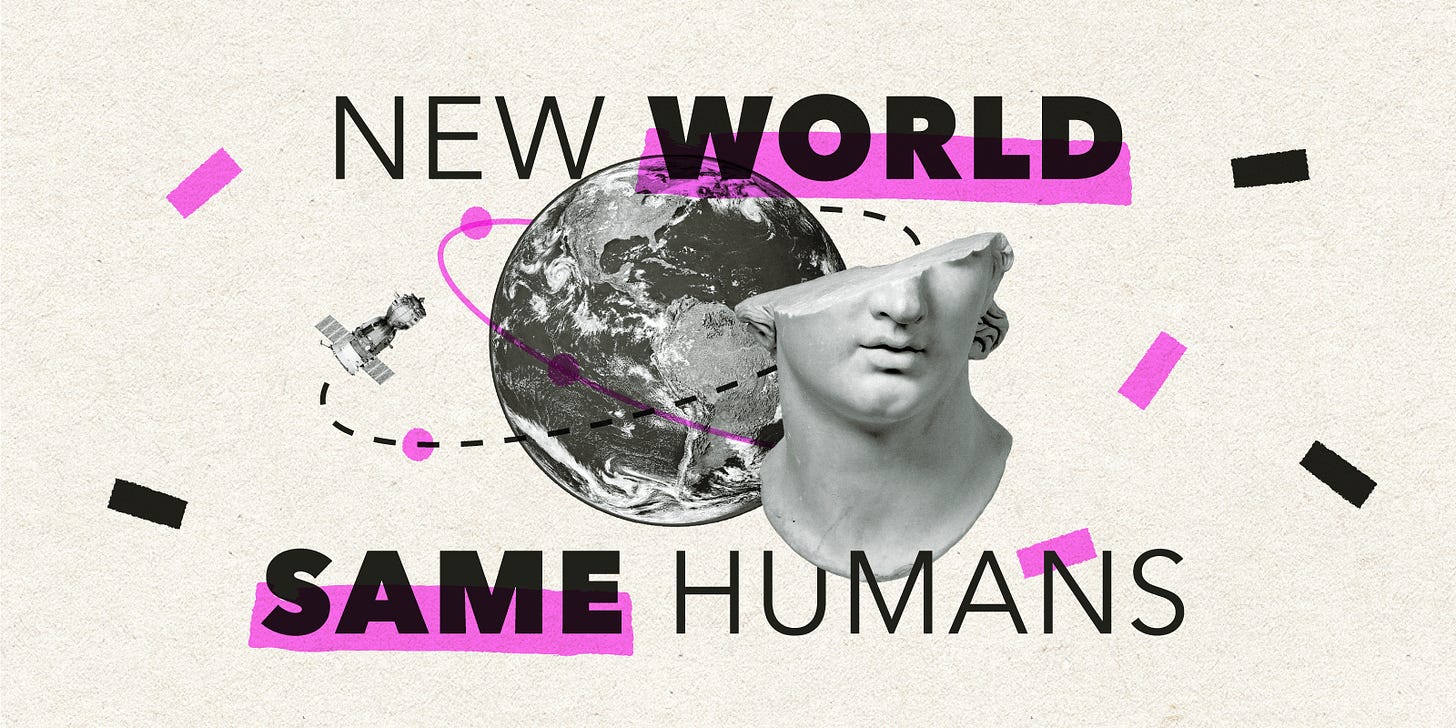Welcome to New World Same Humans, a weekly newsletter on trends, technology, and society by David Mattin.
If you’re reading this and you haven’t yet subscribed, join 18,000+ curious souls on a mission to build a better shared future 🚀🔮
🎧 If you’d prefer to listen to this week’s instalment, go here for the audio version of The People’s Republic of Tech. 🎧
If you’re a regular reader, you already know that I’m obsessed with the experiment in techno-governance taking shape in China.
Two week ago, a document published by the CCP offered a new window on to that project. It’s fascinating in its own right. But the document also poses a powerful implicit challenge to those of us who live inside a liberal democracy.
Specifically, it asks us: what are you going to do about Big Tech? So this week, reflections on all that, and a first attempt at an answer.
Earlier this month, the Chinese government published an intriguing policy document. The Implementation Outline for the Construction of Government Under the Rule of Law is, as it sounds, sterile and technocratic in tone. But it contains a bold vision for a new kind of 21st-century state.
At the heart of the complex changes outlined is a process that will see the Chinese state merge with digital technologies.
The document talks about further developing the CCP’s internet + supervision system, which sees online behaviour closely monitored and controlled. And it calls for national and local government to join up via a network of online platforms that will administer vital functions of the state and deliver public services. Those platforms, says the document – which will include private sector Big Tech firms – must all share data with central government, which will use AI to analyse it and continually refine decision-making, legislation, and law enforcement.
If you’re reading this from inside the Global North, your first thought is probably: sounds pretty dystopian. It’s a legitimate response. But the new Implementation Outline also poses a challenge to liberal democracy, because it delivers an answer that is coherent – even if it’s one we don’t like – to the question: what is the proper relationship between the state and the new centres of power that have emerged online?
Across the last decade, this question has cast a long shadow over the future of liberal democracy. So far, we’ve developed no good answer.
The CCP’s answer is clear. After years of minimal regulation, they’re now acting to assert their primacy. In November, they cancelled the IPO of Jack Ma’s Ant Group. This month they announced action against Tencent, after claiming that WeChat does not comply with laws intended to protect minors.
The message from the CCP is unmistakeable: ‘the US and Europe may be content to allow Big Tech to become a rival power centre, but it’s not happening here.’ Instead, they’re subjugating Chinese tech giants to an overarching vision of total oversight and algorithmic governance. Big Tech can serve this Greater Good – as they see it – or be destroyed.
I’ve written endlessly in this newsletter on how our big platforms – Facebook, Twitter, Google – have amassed a new and strange form of socio-corporate power. It’s not a new thought. Zuckerberg himself has said: ‘in a lot of ways Facebook is more like a government than a traditional company’.
The nature of this power is hard to pin down. But we need to try.
Mass democracies depend on public conversations, and the public spaces in which those conversations occur. In 2021, Facebook, Twitter, etc al are those spaces, and they’ve captured our discourse. The exchange of information, ideas, and argument that makes our democracies work happens extensively – happens, perhaps above all – on these platforms.
That’s a massive shift. It’s one we’ve enabled. The truth is, we’ve never been quite sure whether to treat these platforms as businesses or public utilities. Here in the UK our state broadcaster, the BBC, is always telling viewers to ‘tweet us your views’ or ‘follow along on Twitter’. It would never advertise other businesses in this way. And yet with social media, somehow the rules are different.
We don’t need to spend much time on the consequences. Twitter is a deathly distortion box that amplifies the most toxic voices; it helped bring us the Trump presidency. Facebook won’t tell us how many people have viewed vaccine disinformation on the platform, but it’s a lot.
In the face of these problems, the platforms themselves stall and deflect; see Twitter’s trial of a new ‘misleading’ tag, or Facebook’s ‘oversight board’. Meanwhile, legislators in the EU and US are only now starting to get a grip on the issue, and their machinations will continue for years to come.
So what to do? These are hard problems; there are no easy answers. But here’s an idea for our next step: while the CCP doubles down on the underlying logic of its system – which is techno-authoritarianism – we should double down on ours, which is democracy.
Back in Democracy Without Elections I wrote about Yale political theorist Hélène Landemore and her advocacy for a system she calls open democracy. That system would see liberal democracies give up on the election of representatives, and instead form governments via the random selection of adult citizens who serve fixed terms. It’s an idea intended to make our democracies less elite-bound, more participatory, and more able to think about long-term challenges.
But open democracy could also fuel a radical and productive shift in the relationship between our societies and the social media giants. To apply its principles here, we’d put the mega-platforms under the governance of public councils formed via a random selection of adult users. These councils would have substantial control of key aspects of platform policy, including treatment of disinformation, political advertising, and acquisitions.
It would mean accepting, once and for all, that the social media giants are not ordinary companies, but something new. And that having woven themselves through the fabric of the commonwealth, they must accept a far higher degree of public accountability. They must, in other words, be democratised.
There would be a thousand and one details to address, of course, around the selection of the public councils and more. And the platforms would never accept this without it being forced on them; we’d have to legislate our way there, while explaining that this plan was in their long-term interests too, and the best way to unlock the real good they can still do in the world.
Despite the complications, the underlying principle is a powerful one. Instead of attempting to reform Big Tech via a million legislative incisions, we might instead apply radical and direct democracy. We’d do so knowing that this wouldn’t mark the end of our great project to reorient the relationship between the state and online power. Rather, it would mean a new beginning to that work.
The CCP has its answer to the vast, strange, socio-corporate power now wielded by social media giants. It’s not an answer we can ever endorse. But we must find our own. That journey will be long, but it should begin and end with the people.
Be counted
Thanks for reading this week.
New kinds of online power are fast-forwarding us into an unfamiliar future.
It’s the work of New World Same Humans to make sense of this shift, and a raft of others.
There’s one thing you can do to help with that mission: share!
If this week’s instalment resonated, why not take a second to forward this email to one person – a friend, family member or colleague – who’d also find it valuable? Or share New World Same Humans across one of your social networks, and let people know why it’s worth their time. Just hit the share button!
I’ll be back as usual on Wednesday; until then, be well.
David.





